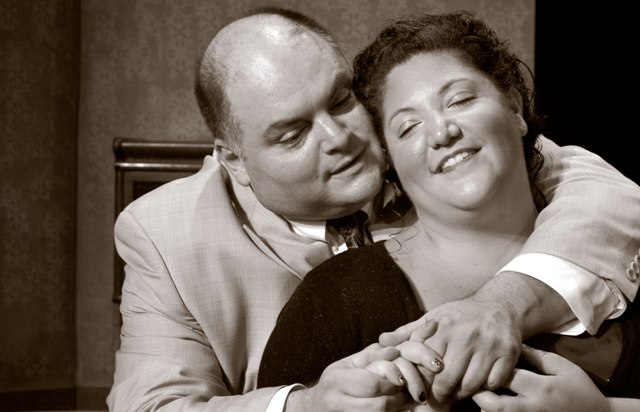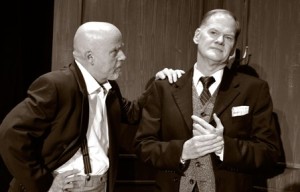A difficult piece done well by South Camden Theatre Company. SCTC chose to open their 10th season with the presentation of a troubled work by an American theatrical legend. Arthur Miller’s oeuvre is full of explorations of strained marriages, the Holocaust and American anti-Semitism. BROKEN GLASS is Miller’s combination of all three themes into a scrutiny of their impacts on the lives of Phillip and Sylvia Gellburg.
In previous research and reviews regarding BROKEN GLASS, the story is presented to revolve around the crippling paralysis of Sylvia and whether it is physical or hysterical brought about by her extreme psychic association with the damage done by Nazis on a night infamously known as Kristallnacht, the night of broken glass. While that indeed is a driving mechanism of the plot, the dissolution of Phillip’s self-created and well-ordered life provides more drama and angst.
Director Craig Hutchings and set designer Robert Bingaman arranged the SCTC stage into three well-lit playing areas containing the appropriate set pieces to convey location. The use of old radio broadcasting and projected newspaper clippings supported the 1930’s sense of time and place. While the spacing, set, and sound worked well even as the action spilled over into the other darkened stage areas, the need for crew to “re-arrange” between scenes broke emotional continuity.
Hutchings’s direction used Miller’s dialogue well to explore the psychological dimensions of Sylvia’s disability but did not show the same level of exploration with Phillip’s collapse. Perhaps that is a fault of Miller’s writing as this play is didactic with intense themes treated heavy-handedly, and production reviews were mixed about the success of Miller’s message. The Hutchings Director’s Notes address the sense of duality of Arthur Miller himself by saying that Phillip represents Miller’s perceived reality while Dr. Hyman represents Miller’s optimal fantasy of himself. This concept alone would make a strong and powerful play. Instead Miller constantly juxtaposes the Sylvia inability to improve with the Phillip struggle with losing control. This is a more muddled message and more difficult to achieve.
Hutchings does well with his cast. The ancillary characters of sister, Harriet, and Margaret Hyman are done professionally by Tami Gordon Brody and Maria Panvini, respectively. These roles become multi-dimensional and believable in the hands of Brody and Panvini. Dan Hickey as Phillip’s boss, Stanton Case, presents a film noir-esque boss as loud and aggressive with the sufficient level of menace in his conversations, or rather confrontations, with Phillip. Sylvia Gellburg, played by Lee Kiszonas, shows a woman who made decisions in her life which she both regrets and struggles to understand. These accumulated traumatic mental injuries to her psyche have left her vulnerable to an attack of hysterical paralysis. While Kiszonas’s portrayal is empathetic and her physical weakness is satisfyingly portrayed, it is also emotionally strong when she manages to extract a tragic confession from Phillip. Kiszonas’s scenes with Dr. Harry Hyman, played by Pat DeFusco, are more disquieting. Again, perhaps Miller did not give enough dialogue to be convincing, but the relationship between Sylvia and Dr. Hyman seems difficult to rationalize at times. DeFusco makes the audience believe his being drawn to Sylvia in his attempt to understand and subsequently to cure her paralysis. Yes, Sylvia is reaching out for comfort, understanding and love after a lifetime without them. But … why would a doctor who has been established as being quite in love with his wife be drawn into Sylvia’s web of need? Why would a doctor who is struggling hard to understand the psychological aspects of his patient’s condition react so strongly physically? DeFusco is warm and solid with Panvini as his wife, but less so with Kiszonas as Sylvia. Michael Hicks, as Phillip, has the hardest acting job of all. Hicks definitely convinces of Phillip’s confusion, anger, hurt and decline as the things with which he has defined his life both slip away and are ripped away leaving him a universally unsuccessful man. While all of these emotions are vital to BROKEN GLASS, Phillip is also controlling and manipulative and fights his losses until the bitter end. These are there but less obvious in Hick’s portrayal.
This is a complex and murky look at complex and murky lives. While nobody leaves laughing, SCTC audiences will leave talking with an appreciation for their own previously made decisions and the rationales behind them. They will be talking about how each decision made can destroy and darken or improve and brighten our lives. What about the choices that need to be made?
SCTC does not make easy choices. That is what makes them a theatre for the masses. Nobody spends their life making only easy choices. SCTC continues to provide a theatrical basis to examine life and to help understand it.
BROKEN GLASS
Written by Arthur Miller
Directed by Craig Hutchings
October 10 – 26, 2014
South Camden Theatre Company
The Waterfront South Theatre
400 Jasper Street
Camden, NJ 08104
Box Office: 866-811-4111
Theatre Office: 856-409-0365
www.southcamdentheatre.org



